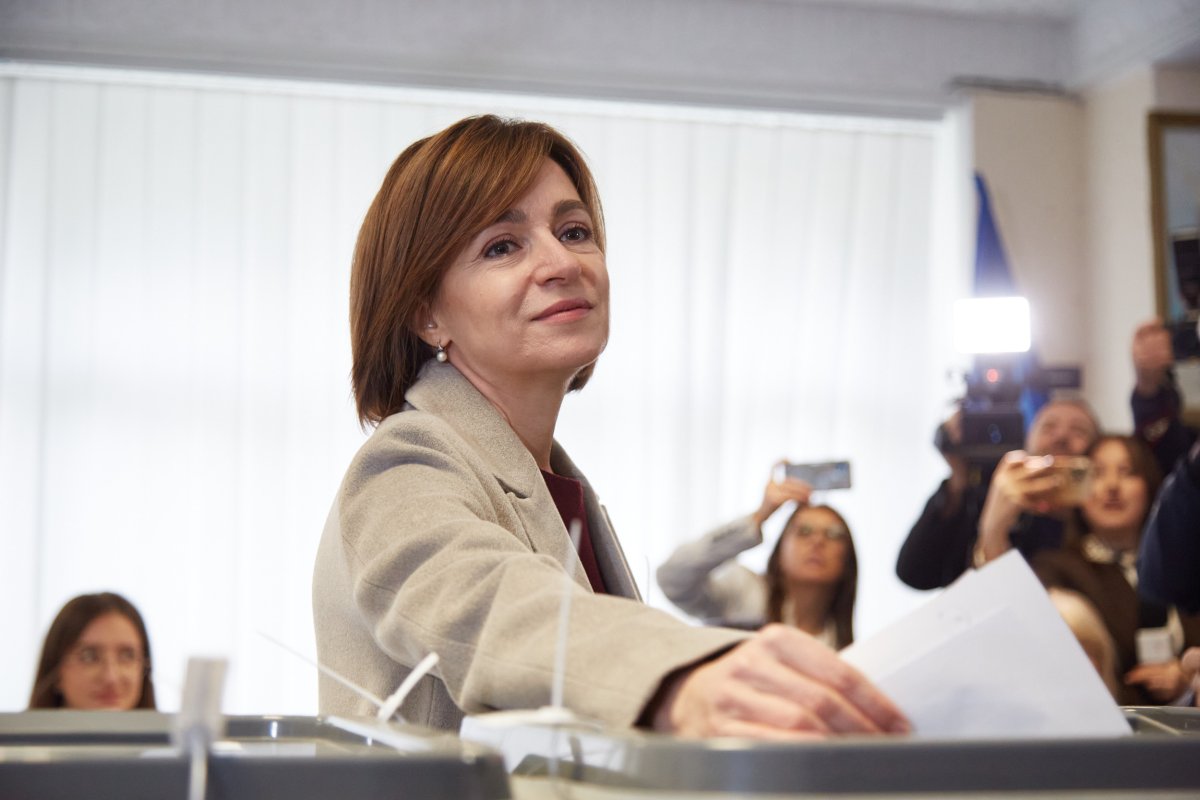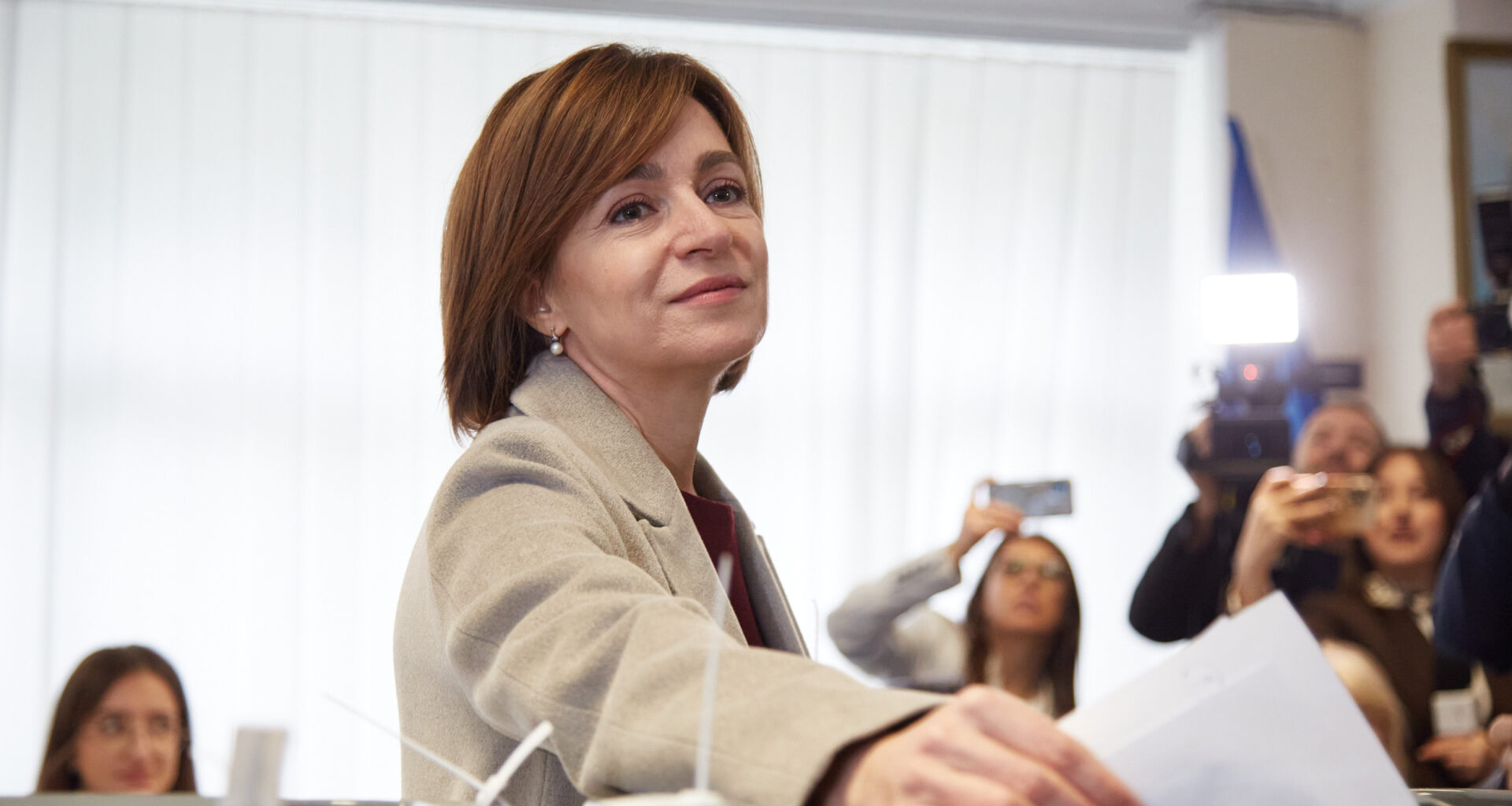Moldova has voted “yes” to joining the European Union with the tiniest of majorities—meaning the former Soviet republic has narrowly agreed to move politically closer to the West and away from Russia’s influence.
Just 50.39 percent of the eastern European country backed the idea of becoming part of the EU in the knife-edge referendum on Sunday—with the country’s president, Maia Sandu, warning that the ballot had been hit by “unprecedented” outside interference. The tight finish sent shockwaves around the world because the referendum had been expected to pass comfortably, according to the BBC, since Moldovan polls all pointed to a clear majority in favor of joining the EU, but the result will still be a blow to the Russian president, Vladimir Putin.
The EU explicitly blamed Russia for trying to subvert Moldova’s referendum, with EU spokesperson Peter Stano telling Reuters about “intimidation and foreign interference by Russia and its proxies ahead of this vote.” There were allegations that Moscow ran a propaganda campaign and bribed Moldovans to throw the vote for cash. For example, fugitive fraudster tycoon Ilan Shor, who lives in Russia, took to social media to openly offer to pay Moldovans to vote “no.”
Moldova is the second-poorest country in Europe after Ukraine under one metric (gross national income converted to dollars using purchasing power parity rates) that is used by the World Population Review website.

Incumbent pro-EU president Maia Sandu casts her ballot on October 20, 2024, in Chisinau, Moldova. Voters were asked in a referendum whether to amend the constitution to make EU membership an official national goal.
Incumbent pro-EU president Maia Sandu casts her ballot on October 20, 2024, in Chisinau, Moldova. Voters were asked in a referendum whether to amend the constitution to make EU membership an official national goal.
Pierre Crom/Getty Images
“Criminal groups… have attacked our country with tens of millions of euros, lies and propaganda, using the most disgraceful means to keep our citizens and our nation trapped in uncertainty and instability,” Sandu said, following the vote.
The Kremlin has denied interfering in the referendum—demanding proof of the claims—and baselessly branded Moldova’s referendum “unfree” because the voting patters in favour of the EU were “hard to explain.”
Newsweek is attempting to reach out by email to the Kremlin and Moldova’s government seeking comment.
The controversy follows allegations of Russian interference in another EU referendum, when the U.K. narrowly voted to leave the bloc in a move dubbed “Brexit” in 2016. The U.S. has also accused Russia of spreading disinformation to influence next month’s presidential election after trying to rig previous American votes.
Moldova, which has 2.6 million people and borders Romania and Ukraine, has been embroiled in something of a tug-of-war between the competing influences of Russia and the West. Historically, the country was firmly in Russia’s orbit, but it is now hovering on the cusp of moving away from Moscow’s sphere of influence permanently. Sandu has been pursuing a pro-EU path for the past four years.
A presidential election was also held on Sunday, with the twin votes running simultaneously.
Sandu won with 42 percent of the vote, while her rival, Alexandr Stoianoglo, (who is supported by the pro-Russian Party of Socialists) achieved a share of 26 percent —a stronger result for him than polls had predicted, according to Reuters. There will now be a run-off election between the two politicians on November 3.
Moldova has already begun the long process of formally joining the EU, but it was hoped that a resounding referendum vote for membership would shore-up the plans. Instead, the shaky win has left that position looking weaker than before, while Sandu now faces a further electoral battle to keep hold of the presidency next month.
